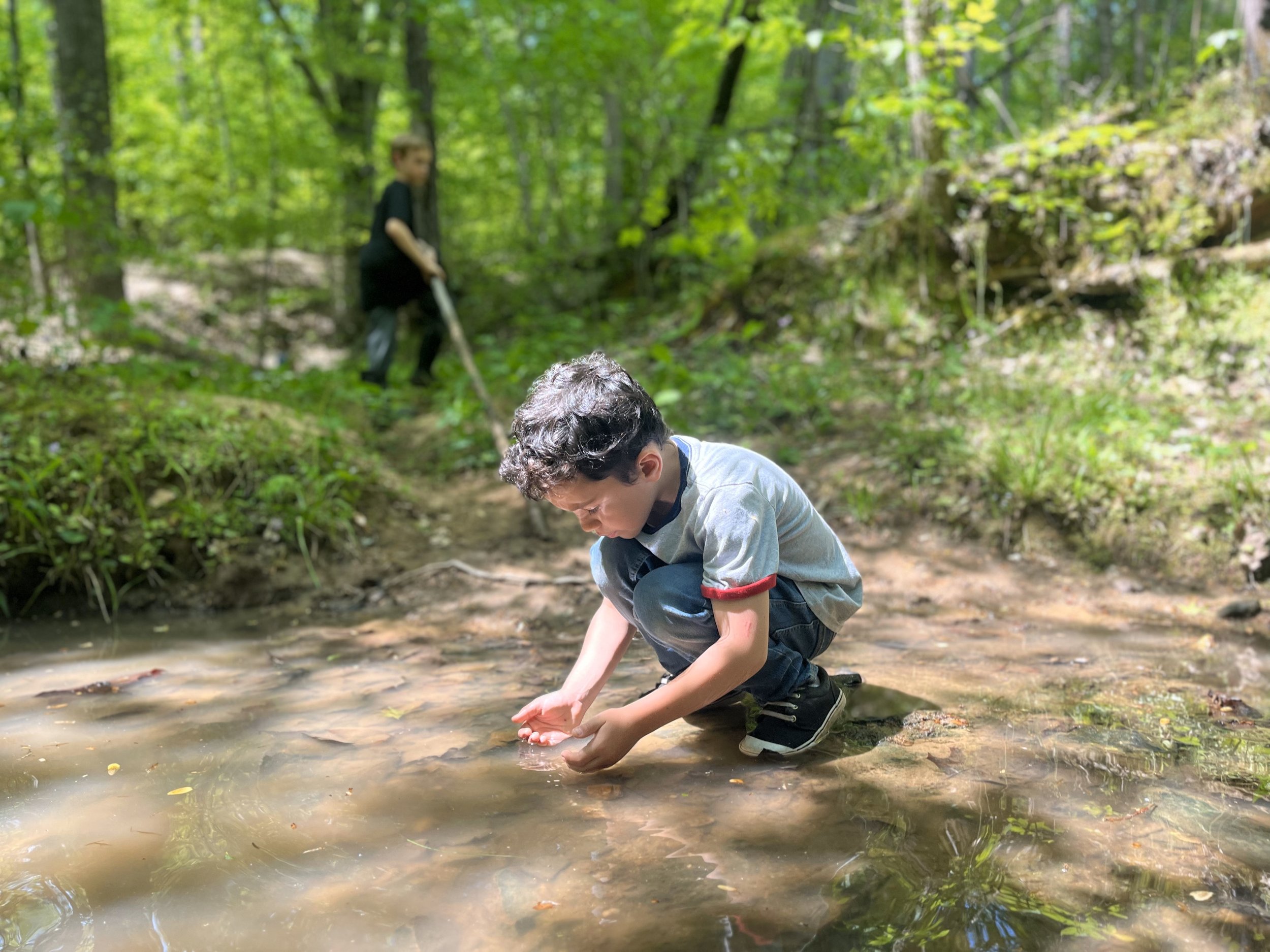
Our philosophy
“The children and nature movement is fueled by this fundamental idea: the child in nature is an endangered species, and the health of children and the health of the earth are inseparable”
— Richard Louv
our programs follow the principles of the forest kindergarten movement.
Wild Hearts Nature School embraces an authentic Forest School approach to education and is heavily influenced by The Cedarsong Way methodology. To learn more about what that means, read below.

What does a forest school education look like at Wild Hearts?
Click on each one of our educational philosophies below to see what these key values look like in practice.
-
Research shows that deep learning takes place when children are meaningfully engaged in something that interests them and is relevant to them. There is no whole-room, one-size-fits-all instruction here!
At Wild Hearts Nature School, this means that children’s interests and questions take the front seat in our daily lessons. Our teachers facilitate and support the child’s learning by providing a rich learning environment, encouraging exploration and discovery, and asking thought provoking questions.
Learn more about the benefits of Child-Led Emergent Curriculum here.
-
In inquiry based teaching, educators support and guide learners to make conclusions on their own. As a result, children build their resilience, confidence, and problem-solving skills.
Wild Hearts Nature School emphasizes inquiry based learning by encouraging students to ask questions and prompting them to engage in a hands-on investigation to discover the answers to their questions.
Studies show that this learning process helps students to make real world connections and engage in higher level thinking operations. Learn more about the benefits of Inquiry Based Teaching here.
-
Wild Hearts Nature school believes that, as humans, our well-being depends on being comfortable with ourselves and with the natural world around us. Children, as well as adults, need a sense of belonging.
A child’s sense of belonging comes from their direct experience with their immediate community: the people, places, flora, and fauna around them. Children develop feelings of love and nurturing towards the land when they return to the same place repeatedly.
Wild Hearts Nature School wishes to help children bond with their local forest, find their place in the world, to feel at home in their selves and with the earth where they live.
To learn more about the power of place based education, click here.
-
Wild Hearts Nature School maintains a 1:6 (or lower) ratio of staff to students. This is 1/3 the number of children in a typical classroom!
By keeping class sizes small, we get to know the unique interests and needs of each family. This fosters a tight-knit community of children, staff & families.
Our small class sizes also allows our teachers to be fully present with each child’s discoveries. This ratio provides teachers with the opportunity to notice, praise positive behavior, and reinforce that behavior in the moment.
Finally, Wild Hearts Nature School maintains a low teacher to student ratio in order to practice good stewardship of the natural environment. We desire to decrease any negative impact on the physical land due to overuse.
For more information on why small class sizes matter, click here.
-
At Wild Hearts Nature School, we find joy and opportunities for learning in all (safe) weather conditions. We are a firm believers in the idea that there is no such thing as bad weather, just bad clothing.
We believe that children, like nature itself, are vibrant, dynamic beings meant to explore the full range of weather conditions. From the warmth of a summer breeze to the crispness of autumn leaves, and the soft patter of raindrops to frosty winter mornings, every weather element presents an opportunity for growth and discovery. Our programs embrace nature in all its forms, ensuring that children experience the wonders of every season.
Studies show that exposure to diverse weather conditions builds resilience in children. Learning to appreciate and adapt to changing environments equips children with valuable life skills. By facing a wide range of weather and adapting, children grow in their sense of flexibility and in the ability to find joy in every season. They learn to observe the subtle shifts in the environment, recognize patterns in nature, and understand the seasonal behaviors of flora and fauna.
In the rare occasion that it is truly unsafe to be outside, parents may be called for early pick-up.
Discover more of the benefits of all weather nature immersion by clicking here.
-
Wild Hearts Nature School guides children towards being respectful, mindful, and empathetic towards all of nature’s living beings by using Compassion Scaffolding.
Compassion Scaffolding is an educational technique and metaphor. In this metaphor, the child is the “building” while the teachers are the scaffold around it. The role of the teacher is to provide support, structure, and encouragement as the child rises and grows. Teachers introduce or remove “supports” at just the right moment, constantly challenging students to improve their own skills without throwing them into a challenge that is too big for them to handle.
At Wild Hearts Nature School, we pay careful attention to individual children and their needs. We model awareness and empathy for our students, which fosters independent thinkers who are confident in their own abilities and who have a deeper understanding of themselves, others, and the world around them.
To learn more about compassion scaffolding, click here.

